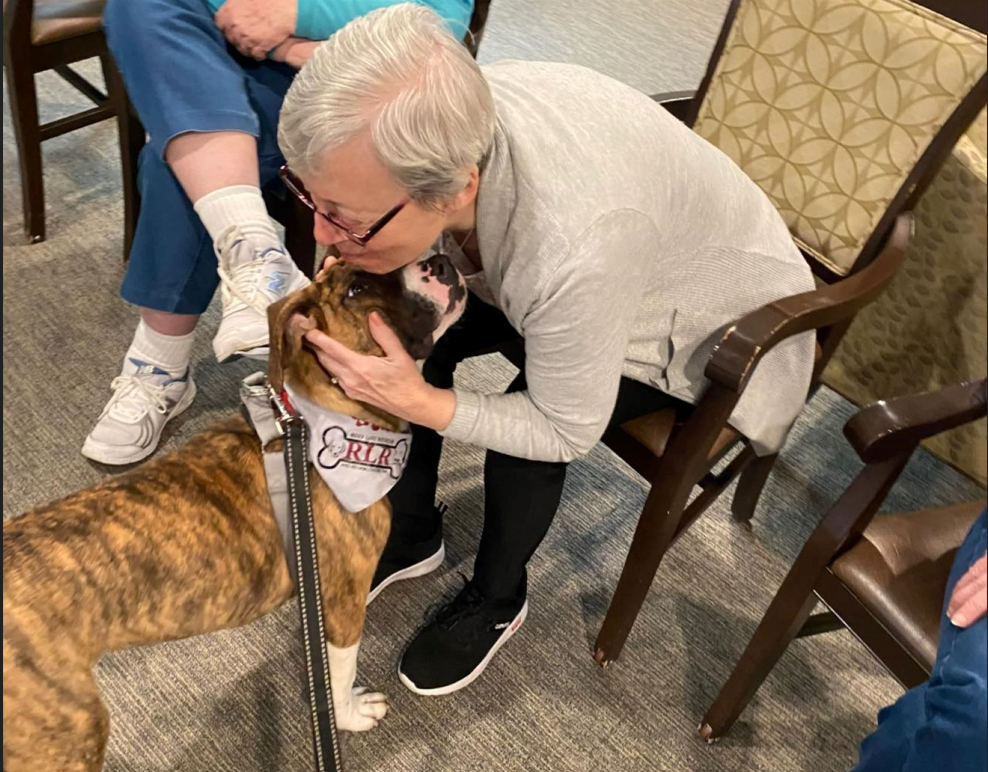Can “man’s best friend” also be a dementia patient’s best friend? The South Mountain Memory Care community in the Allentown-Lehigh Valley area finds that when our residents are introduced to visiting animals, both residents and animals are soothed by each other’s company.
What is Animal Assisted Therapy for memory care residents?
Animals, whether personal pets or visiting therapy animals, bring comfort and companionship to patients suffering from injuries, illnesses, and diseases, including dementia, and even grief. Animal Assisted Therapy (AAT) continues to be studied as a beneficial and complementary treatment for behavioral and psychological symptoms when the type of animal and the needs of the patient are matched.
In some cases, caring for a personal pet can bring a sense of calm, purpose, and familiarity to an Alzheimer’s or other dementia sufferer. In other cases, especially in memory care communities, an occasional visit from a therapy horse, dog, or other peaceful animal can bring joy, peace, and delight to a person.

What are the benefits of Animal Assisted Therapy for memory care residents?
Research has shown that AAT can improve a person’s mental and physical health. Dementia patients can become agitated and even combative. In light of those responses, gentle animal contact can release an automatic relaxation response and reduce anxiety. Residents who feel lonely or have trouble recalling memories have found cheer and improved memory recall during AAT.
Physically, AAT can contribute to lower blood pressure and improved cardiovascular health, and even reduce the need for medication.
Specific benefits include:
- increased physical activity: people can pet the animal and perhaps go for a walk.
- reducing causes of agitation, restlessness, disorientation, and aggressive behavior.
- improved short-term memory and communication skills.
- enhanced eating habits.
- reduced feelings of loneliness.
Petting and cuddling their animal releases those “feel-good” hormones like dopamine that help enhance pleasure and the above effects.
What if a live pet is not practical?
Certain animals make good temporary or permanent companions for good reasons. Fuzzy bunnies are not argumentative. Dogs are helpful, love unconditionally, and have soulful eyes. Fish are not huggable but don’t demand much. Cats are … well, cats … but there are robotic versions that don’t have minds of their own.
Whether real or robotic, encounters with furry or finny friends can be part of a comprehensive, effective therapy program for Alzheimer’s and dementia patients.
Information based on “Effectiveness of the dog therapy for patients with dementia – a systematic review.” Nothing in this blog is to be construed as medical advice. The reader is urged to contact appropriate experts for help.
Whatever the cause or level of your or your loved one’s memory issues, South Mountain Memory Care, with our unique culture, “small house” model, and abundance of certified caregivers, offers you the peace of mind of knowing your loved one will be cared for as if they were our family—which they are!
South Mountain Memory Care is committed to providing individualized, compassionate care to support our residents in achieving a well-balanced lifestyle. We strive to allow our residents to remain independent while emphasizing safety. Our focus is to enrich their life—mind, body, and spirit—by bringing new initiatives into their day-to-day regimen while maintaining the activities they find comfort in. South Mountain Memory Care offers the peace of mind you deserve. When it comes to those you care so deeply about, we understand because we care, too.
